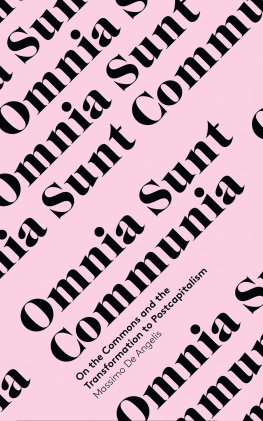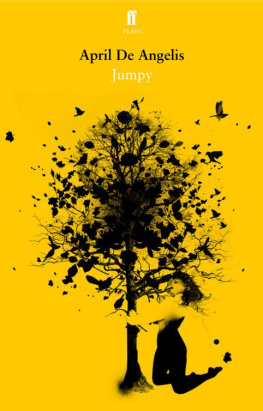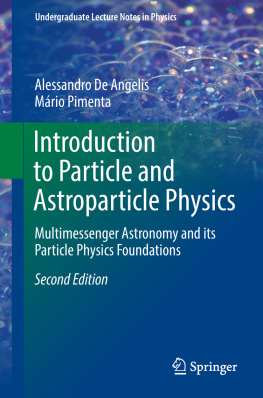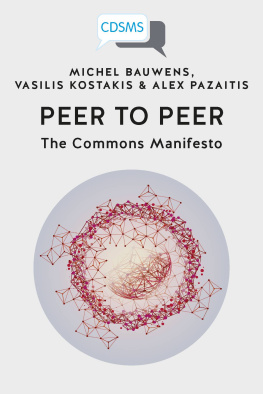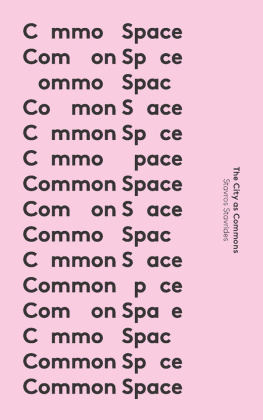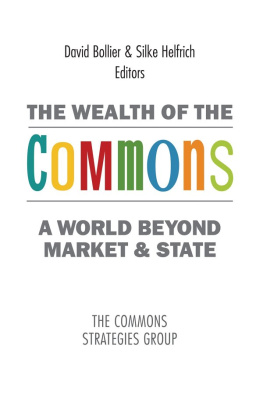In Common
The architects of our lives are divided. There are those who insist that there is still no alternative to neoliberalism. Despite the many crises it has provoked, they continue to push for competition in every sphere of life, to widen the wealth gap, to ignore climate change and to pursue the steady dispossession of our rights and commonwealth.
Then there are those advocating change, those who seek to persuade us that capitalism can be saved from itself. They conceal capitalism behind a human face. They tell us that environmental disaster can be averted through technological solutions. They say that deeply rooted social injustices can be cured with a little more economic growth. That well be safer with more police on our streets.
And yet, we know that capitalism is dying, that its lies have been unmasked, that its grip on our world and our lives is maintained only through expropriations, dependency and commodified desires. In Common is a collection of works that see an end to capitalism without apocalypse. It provides us with techniques for building another world, and it narrates practices of alternatives and theories of hope. It is a glimpse into our shared present, for a future in common.
In Common is published by Zed Books under the creative commons license. You are free to share this material, transform and build upon it for non-commercial purposes.
Series editor: Massimo De Angelis
Already published: Stavros Stavrides, Common Space: The City as Commons
Omnia Sunt
Communia
On the Commons and the
Transformation to Postcapitalism
Massimo De Angelis

Omnia Sunt Communia: Principles for the Transition to Postcapitalism was first published in 2017 by Zed Books Ltd, The Foundry, 17 Oval Way, London SE11 5RR, UK
www.zedbooks.net
Copyright Massimo De Angelis 2017
The right of Massimo De Angelis to be identified as the author of this work have been asserted by him in accordance with the Copyright, Designs and Patents Act, 1988

This book is licensed under the Attribution-NonCommercial 4.0.
International Creative Commons license (CC BY-NC 4.0).
Typeset in Minion by seagulls.net
Index: John Barker
Cover design: Dougal Burgess
All rights reserved. No part of this publication may be reproduced, stored in a retrieval system or transmitted in any form or by any means, electronic, mechanical, photocopying or otherwise, without the prior permission of Zed Books Ltd.
A catalogue record for this book is available from the British Library
ISBN 978-1-78360-063-2 hb
ISBN 978-1-78360-062-5 pb
ISBN 978-1-78360-065-6 pdf
ISBN 978-1-78360-064-9 epub
ISBN 978-1-78360-066-3 mobi
Contents
Tables, figures and boxes
Tables
Figures
Boxes
Acknowledgements
This book is the creation of many discontinuous encounters, with people, books, situations and life processes. Each of these encounters brought home to me a confirmation or a dissonance, a question or an exclamation mark. To search for the commons meant to leave the normalised part of me sitting silently in its cynical sulk about the worlds condition, and to open out for the warmth of human commoning. This was the only way for me to do research on the commons. As this work is not a literary piece, this warmth will not be greatly expressed through the book. But I would never have been able to carry out this research without having experienced the love, the friendship and the experience of community with many of the people who taught me about the commons. In the first place, unlike with many other subjects in science, the student of the commons cannot avoid examining also the position in which he or she, the author and researcher, is located in much of daily life and their immediate circle of affects and love. The micro-commons of my family, and the commoners therein, became the most immediately approachable mirror for my ongoing internal dialogue on the system, on aspects such as the properties of the commons and the aporias of the process of commoning. I must therefore thank Dagmar and our two sons Leonardo and Nicola for their support in critical times and for their patience in having to deal with my never-ending work on the book in the midst of multiple other work and life pressures, and my often inappropriate attempts to consider the kitchen floor as a seminar room, although we still had lots of fun to common.
In 2008, my family went to live in a small village in the Apennines near Modena. Since then, I have absorbed the schizophrenic and creative shock of working and living in two so incredibly different places: Monchio, a tiny dot on some not all maps, where life runs slow and an open valley crowned by mountains makes you smile in the morning; and London, the global city that never stops, in which community-less crowds run to get the tube in order not to be one minute late to work. This shock has been extremely formative for me and my understanding of the commons, as I realised through my body the poverty of the metropolitan well-off, and the richness of the villagers worst-off.
The key moment of realisation occurred one day when I felt hungry on the tube when travelling to evening class, while surrounded by people going home from work who were all eating crisps. I pulled my sandwich from my bag, and at the first bite I realised how rich I was: for every ingredient in my succulent sandwich, bread included, I knew the faces of its producers, I had joked with them and shared smiles; with some I had planned together, I could trust their method of production without the need for any organic certification, I could even celebrate some commoning for the tomatoes and salad leaves. From that moment, London appeared to me to be a mystery, even though I had lived there for almost thirty years and had enjoyed quite a good time: the traffic, the shopping malls, the full buses, the expensive transport, the replicant shops and brands, hug for having given me first-hand experience of the complexity of maintaining cohesion and motivation even in such small groups, as well as the excitement of commoning and of the new projects spinning out of it. I hope to continue our journey in always new territories.
This book is also the result of years of research in the field beyond my immediate circles. I had the privilege to visit commons spaces and talk to commoners in Italy, the UK, Greece, France, Germany, Spain, Switzerland, Austria, Croatia, the USA, South Africa, Mexico, Brazil, Ecuador, Bolivia, and Peru. At meetings I have attended, I was able to talk to commoners beyond these countries: Columbia, Argentina, Paraguay, Uruguay, Chile, Canada, Nigeria, Uganda, Tanzania, India, are only the ones I can remember. Some of my informants gave me key insights into aspects of the commons, while others broadly confirmed them. In this book I have illustrated some of the cases that were very formative material for me, that forced me to travel further along my theoretical journey and explore and select new ways of thinking, so as to understand the new insights as aspects of the commons. I must therefore thank Patrick Bond and the Rosa Luxemburg Foundation for making possible my visit to Durban and Johannesburg in 2004, and Prishani Naidoo for introducing me to the South African anti-privatisation struggles around water and electricity, and for guiding me to the township of Orange Farm, where I was able to gather key early insights into the internal dynamics of a commons movement.
During the summers of 2007 and 2010 I participated with friends and colleagues around The Commoner journal in the commoner convivium, generally a week-long experience of very intense encounters, in which we shared cooking and child care, we played with words and balls, we napped on hammocks and forest turf, and we talked endlessly about the different crises of the time, the different movements, and the commons. In these contexts I matured, either by symbiosis or dissonance, the stimuli to develop further my theoretical framework, in order to make it possible to include all our voices in the commons. At the convivia I realised in my body although I already knew it in my mind that among the different opinions and positions expressed on a given topic, it was impossible to select just one to define the commons. A difficult process of consensus seeking, even at this theoretical level, was necessary to move on, although when that consensus was reached, the different positions often kept alive at least in the individual internal debates. This taught me that complexity is to be found also in small groups in communication, and that it is impossible to define the politically correct commons with the correct line, or understanding of the world. Hence the need emerged in my mind to define frameworks that allow for a continuous flux of argument and a diversity of beliefs and values, but with a mechanism that is able to reach consensual decisions. Commoning is thus, therefore, an ongoing dance of values, kept together by the rhythm of our daily reproduction and the decisions that need to be communally taken in given contexts. With this preoccupation in mind, I later encountered the work of Humberto Maturana and Francisco Varela, providing a systems view of cellular life which I began to translate with some difficulty in terms of the commons system within the context of our capitalist political economy. The step from studying Maturana and Varela to utilising one of the insights of Luhmann, and later complexity theory, was relatively short. Many people participated in our convivia, but I must especially thank those I worked closely with during that period and who pushed my thinking in the years that followed: Camille Barbagallo, Nick Beuret, George Caffentsis, Mariarosa Dalla Costa, Olivier De Marcellus, Emma Dowling, Silvia Federici, Viviane Gonik, David Harvie, Suzanne Lerch, Tadzio Muller, and Hans Widmer.
Next page
